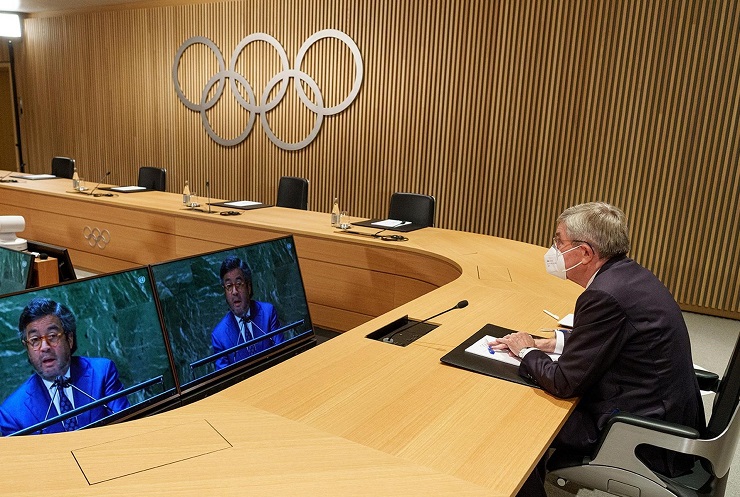
In recent months the US has attempted to flex its geopolitical might on the global stage in regards to China.
First, the US attempted to trigger a widespread diplomatic boycott of the 2022 Beijing Olympic games. After announcing no US diplomats would attend the games in Beijing, Australia, the United Kingdom, and Canada followed. New Zealand would notify Beijing it would not send any diplomats “mostly to do with Covid,” Bloomberg would report.
While the Western media has attempted to portray this as a severe blow to China, it was widely expected that this handful of Western nations would do all in their power to derail or otherwise disrupt the games. Other nations including in the West have said there will be no boycott – this includes even France – who until recently had been a celebrated partner in advancing US foreign policy around the globe.
The Anglo-American boycott took place as the United Nations collected signatures for the Olympic Truce. The Sydney Morning Herald would report in its article, “Australia refuses to sign ‘truce’ for Beijing Olympics as it weighs up diplomatic boycott,” that:
Since its revival in 1993, Israel and North Korea are usually the only countries not to sign the truce. But the United Nations General Assembly on Thursday passed the resolution without the support of 20 countries.
None of the “Quad” members – United States, India, Australia and Japan – sponsored the resolution, and New Zealand was the only country in the Five Eyes intelligence-sharing network, comprising Australia, NZ, Canada, the United Kingdom and the US, to sign the truce.
While 20 may seem to be a large number, it is out of a total of 193 UN member states or about 10%. Considering the seriousness of the accusations the US and its allies have leveled against China, 90% of the world’s nations remain unconvinced and unmoved by America’s attempts to isolate China – and instead – the US seems to be only isolating itself.
China was the target again regarding Washington’s self-organized “Summit for Democracy.” The invitation of representatives from Taiwan was meant to “snub” Beijing and other nations outside of Washington’s orbit. However, again, things backfired.
Many uninvited nations expressed no concern at all. Former Singaporean foreign minister George Yeo would tell China’s Global Times in an interview that, “ the objective of Singapore democracy is to serve Singaporeans and not to satisfy US criteria.”
More embarrassing still were nations who were invited by Washington but declined to attend – even though the event was “virtual” and all that was required to show up was turning on a computer.
Pakistan was on one of these nations. It was invited but declined. The Guardian in an article titled, “‘An urgent matter’: Biden warns democracy is under threat at summit,” would claim:
Pakistan pulled out of the summit on Thursday, in a moment that was abruptly announced by the foreign ministry, without giving a reason. A source at the ministry of foreign affairs in Islamabad said that Pakistan is not taking part in it, as China was not invited.
Pakistan has many reasons not to play into Washington’s geopolitical games especially in regards to a “summit” as transparently designed to serve US geostrategic interests as this recent virtual gathering had been.
Pakistan counts China as one of its closest allies and a key partner in both military and infrastructure cooperation. The “Summit for Democracy” was clearly aimed primarily at China and Pakistan’s refusal to attend sent a clear signal to where Islamabad sees the world being in the near to intermediate future.
Washington’s two decade long military occupation of neighboring Afghanistan and US state sponsorship of terrorists in Pakistan’s southwest Baluchistan province who are targeting Chinese engineers and Pakistani security forces protecting them, obvioulsy didn’t make it any more enticing for Pakistan to attend.
The center of global power is clearly shifting and the US only has itself and its approach to foreign policy to blame.
The US’ attempt to claim back the moral high ground and in turn its global primacy is ironically being pursued through one of the most transparently unethical propaganda campaigns in modern history. It is also being pursued through economic means and even the threat of military coercion.
Washington’s insistence that China is a threat to global peace and stability is demonstrably undermined by America’s own behavior on the global stage, clearly and undeniably threatening peace and stability.
It is difficult to know just how far the US will go to prevent China’s otherwise inevitable surpassing of it and the rest of the West – but one thing is for sure – American influence is in visible decline. Once easy exercises of marshalling the world’s nations against a targeted foe at the UN to demonstrate Washington’s global power and resolve have now become awkward and revealing demonstrations of its growing weakness.
Brian Berletic is a Bangkok-based geopolitical researcher and writer, especially for the online magazine “New Eastern Outlook”.
Source: https://journal-neo.org/2022/01/07/from-summits-to-boycotts-america-s-waning-influence/

 January 12, 2022
January 12, 2022  Опубликовано в
Опубликовано в